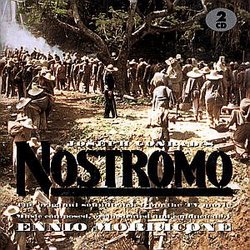Pure lyricism in tropical land
Eugheni Leghedin | Ekaterinburg, Russia | 01/21/2001
(5 out of 5 stars)
"Yet I have not seen TV movie "Nostromo", it is a real pleasure to listen this soundtrack. All Morricone trademarks are here - lyricism, fugue technique and perfect instrumentation. The political upheaval in tropical country Costaguana is painted with dark strokes in contrast with delicate flute passages. Morricone mixes beautiful woman vocalizing, appropriate ethnic instruments (the Andean pan-pipes) and brilliant orchestration. The most precious are lyrical themes "The silver of the mine", "Gisella" and "Nostromo". Wonderful CD!"
One of Morricone's very finest scores
Trevor Willsmer | London, England | 04/26/2009
(5 out of 5 stars)
"With Ennio Morricone you always have to be careful what you buy. Even his most ardent supporters will admit that for every Once Upon a Time in America there is an awful lot of guff. For this reason, many casual buyers missed out on Nostromo unless they were among the few to catch the show. In the UK at least, a combination of bad scheduling and a near-total lack of publicity resulted in low enough ratings to ensure that the album's release went virtually unnoticed - a shame, since Polydor have done a nice job on it. A double CD with picture discs - one of Morricone himself - and an appropriately silver logo (the tale revolves around the corrupting influence of a silver mine), it is the most satisfying Morricone album in a very long time.
The series itself is something of a curate's egg. Despite impressive moments it is stunted by a typically constipated turn by Colin Firth and an ill-matched international cast who don't all seem to have realised that they are in the same show and never attains the passion or depth of tragedy it aspires to. Though Morricone might not seem an obvious choice for Joseph Conrad's tale of good intentions gone tragically wrong in the volatile South Americas of the last century, Morricone's score is something of a triumph, an outstanding work that grows in resonance every time you hear it. True, the score is not best used or best mixed in the series but definitely comes into its own on disc, where it amply repays repeated listening.
The series' frequent lack of forward drive actually does the music a service; the ambling pacing making for longer, more considered and satisfyingly developed cues. Morricone isn't scoring for the next 20 seconds but for the whole movie. He doesn't just score for character or incident either, but for time and place as well - with cues like Greed you can feel the heat and festering corruption in the air. The political and moral instability is reflected in the sense of unease that permeates throughout the score. This isn't hyper-scoring that pumps you up with each cue, but measured and considered: as with the best of Morricone, it's more state-of-mind than state-of-play, feeling the mood of the piece rather than Mickey Mousing at every turn.
Whereas the main interest with many of the current generation of composers is wondering who they are going to rip-off in the next few bars, one of the chief pleasures of Nostromo is that Morricone is writing his own music in his own style. All the Morricone trademarks are here - wordless vocals - but there's also something that's been all too often missing from his recent work: passion. It was Nostromo's producer Fernando Ghia who revitalised Morricone's career with The Mission (briefly echoed in the opening bars of For Emilia) and after far too many lazy off-the-shelf-and-cut-to-fit identikit scores one senses that the composer responded with genuine commitment and feeling to the project.
Many of the devices are simple - such as a locomotive rhythm counterpointed by flute and caval for the silver train - yet effective because Morricone keeps a human voice at the centre, a doomed yearning for something better. And in the six-minute Weapons of Love he has written one of his most soulful cues in many years. True, it covers familiar territory, but with an unaffected mastery we haven't heard from him in far too long. Here it works because it feels like Morricone means it this time rather than just going through the motions.
True, there are similarities to The Red Tent in The Old Mine and The Untouchables end title in The Silver of the Mine, but whereas that score seemed at times a pick-and-mix of Morricone's greatest hits, this is an altogether more successfully integrated work. At times it has a distinctly sixties feel, with Morricone's raw, sometimes unadorned use of violent percussion not dissimilar to Maurice Jarre's epic scores of that period (most notably in Sulaco's Band, parts of which would not seem out of place in Grand Prix or Is Paris Burning?). Whilst there is some repetition over the two discs, you won't complain.
Enjoy scores like this while you still can. I doubt that there is a composer under 40 with either the time or the talent to produce a work with this kind of maturity.
"

